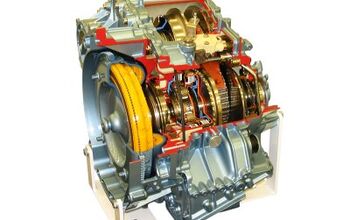Piston Slap: Justy-fied Freestylin' on CVTs, Part VII

Bob writes:
Hi Sajeev,
I think a survey of continuously variable transmissions (CVTs) would be useful. I’ve read that there are two types: sliding belt and variable planetary gearset. Which car brands use each and what does the cognoscenti think of them?
Anyone with time to kill on Google and YouTube can do this — but how often do we ask ourselves this question?
The CVT’s history, from Leonardo Da Vinci to the Ford Five Hundred, is a worthwhile read. Frankly, I’m saddened that a CVT-heavy automaker such as Nissan hasn’t played up the Da Vinci connection in its marketing. Who would’ve thought the CVT predates many other boxes ‘o gears, much less the automobile?
Wikipedia has a detailed overview of CVT designs, and here’s another simpler explanation. Finding the differences between automaker’s implementations is more difficult: Google image searching shows that most CVTs now sold in new vehicles are of the variable-diameter pulley design variety. You mentioned a variable planetary gearset design, but that design only seems to apply to the reverse gear drive.
I assume the major differences in automotive applications are in chain/belt design, reverse (planetary) gear operation and electronic tuning. If I’m wrong, well, we know what’s gonna happen in the comments section; we shall see what the cognoscenti thinks. But I have the floor for now.
From my handful of Nissan rental cars (shout out to the responsive unit in the 2010 Nissan Altima) to the slow but uber-efficient unit in the Mitsubishi Mirage, I rather love CVTs. But since CVTs have significant torque limitations, automatic Corvettes, Mustangs, HEMIs and Teutonic Iron can breathe easy.
In non-performance applications, today’s multi-speed autoerratic gearboxes are slow to upshift and dangerously slow to downshift at full throttle. Granted much of this resides in the computer tune, and automatics are responsive enough at part throttle, but so are CVTs. If today’s eight-plus-speed autoboxes are (likely) packed with unique hard and soft parts that will be a financial nightmare to rebuild further down the depreciation curve, and they cannot match a CVT’s inherent efficiency … why exactly do we stick with this technology?
Electric cars with much simpler gearboxes are here to stay, and once a CVT can handle the torque of a V8 muscle car and/or luxobarge, upshift with the speed of a shift-kitted automatic transmission in a factory-programmed “sport mode,” all the while retaining its significant efficiency and simple design benefits, we might see the demise of the conventional automatic transmission.
[image: Shutterstock user Pixel B]

More by Sajeev Mehta
Latest Car Reviews
Read moreLatest Product Reviews
Read moreRecent Comments
- Jrhurren Legend
- Ltcmgm78 Imagine the feeling of fulfillment he must have when he looks upon all the improvements to the Corvette over time!
- ToolGuy "The car is the eye in my head and I have never spared money on it, no less, it is not new and is over 30 years old."• Translation please?(Theories: written by AI; written by an engineer lol)
- Ltcmgm78 It depends on whether or not the union is a help or a hindrance to the manufacturer and workers. A union isn't needed if the manufacturer takes care of its workers.
- Honda1 Unions were needed back in the early days, not needed know. There are plenty of rules and regulations and government agencies that keep companies in line. It's just a money grad and nothing more. Fain is a punk!


































Comments
Join the conversation
ive owned 7 japanese scooters since the 80s, and currently have over 30000 miles on a yamaha TMax 500. all are CVT driven, and all have been durable, reliable, and easy to maintain. OTOH, the one vespa i had- a 1972 primavera basket case, i could never get that thing to work correctly. replaced the clutch, cruciform, a couple gears, clutch cable, shifter cables... it would still pop out of gear. you can tune CVTs for power by replacing various springs and rollers to hold it in a lower (faster) ratio for longer but IMO its not worth it.
The video featured a render of a FWD BMW. Is there a FWD BMW with a CVT?